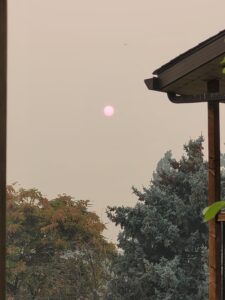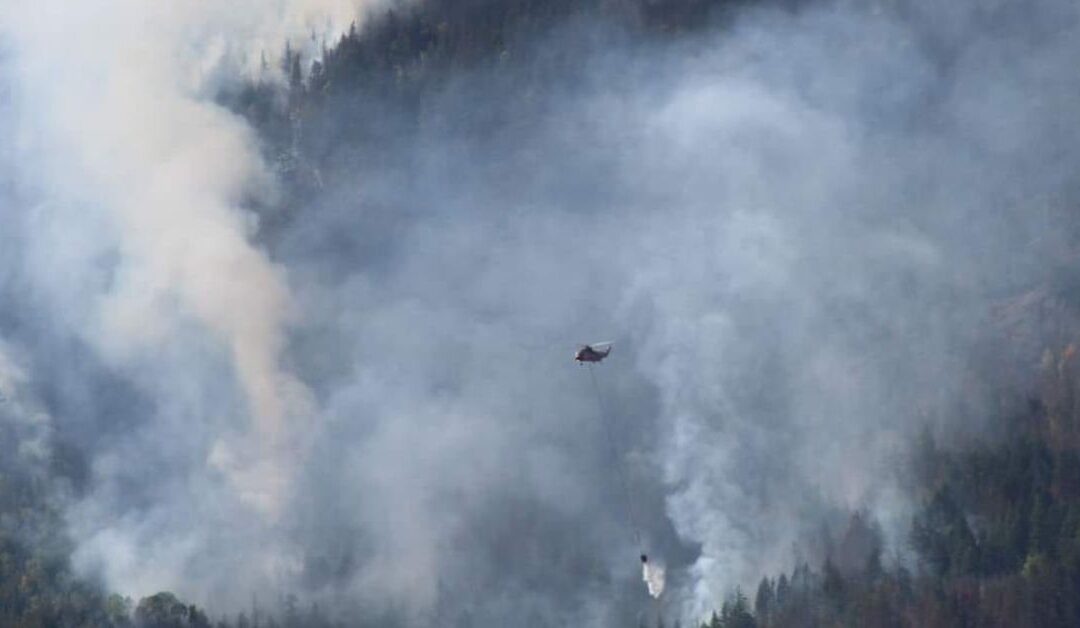This Op-Ed by Linda Thyer and Arden Henley, was originally published in the Vancouver Sun, August 29, 2023.
Opinion: The smoke in the air that impairs our health and compromises our capacity to breathe is a form of subsidizing the fossil fuel industry
Here we are on this beautiful, late-summer day in Vancouver sitting listening to the hum of an air purifier rather than picnicking at the beach because the current air quality is 9.2 times the level of particulate matter recommended by the World Health Organization. Environment Canada has issued an air-quality advisory for Metro Vancouver for the umpteenth time this summer because of smoke from the record level of wildfires raging around the province.
Particulate matter from wildfires is damaging to the lungs and is especially problematic for people with underlying conditions, such as lung disease, heart disease and diabetes, pregnancy, infants and children, older adults, outdoor workers (e.g., construction and agricultural workers), and people who are experiencing homelessness or are under-housed. In fact, it is a distinct disadvantage to live in situations that do not have air conditioning or other means of reducing the level of particulate matter. It goes without saying that these smoky conditions burden an already overloaded medical system with people now showing up at emergency rooms with problems related to poor air quality.
Deservedly, the prevalence of wildfires and smoky conditions this summer in B.C. has evoked a hue and cry among the populace. Despite previous experiences, such as the burning of Lytton and numerous reports, governments at all levels appear to insist on a “wait and see” fire management strategy and, on many occasions, end up playing catch-up with roaring conflagrations.
However, in the coverage of this tragedy and its aftermath there is a danger that we will lose sight of the major issue. Yes, we need improved fire prevention and management strategies, including learning from Indigenous communities. At the same time, we need to recognize that the increase in frequency and intensity of fire and smoke, here and elsewhere, is due to a warming climate — and that global warming is caused, in large measure, by human behaviour, primarily the extraction and burning of fossil fuels, including liquified natural gas. As fossil fuel industries continue to search for more oil and gas and expand production because of our continued reliance on coal, gas and oil, air quality will continue to worsen. Increasing levels of carbon emissions heat the planet, creating the hot and dry conditions that make the growing number and intensity of wildfires more probable. Poor air quality from smoky skies hampers our ability to breathe and impairs our health overall. This is a direct impact of the fossil fuel industry on our health, with the added healthcare costs being borne by all of us. What we are being asked to do is subsidize the fossil fuel industry and our attachment to this form of energy with our capacity to breathe.

But with the acknowledgement that the climate crisis is largely anthropogenic comes the opportunity for change; further heating (beyond the lag effect of current emissions) of the planet is, in large part, dependent on our behaviour. This means that by changing our behaviour we can change the trajectory of global temperature and its resulting impacts on the climate, including the droughts and heat that lead to the wildfires.
Our current way of living is based on the false assumption that the Earth can provide all we need for infinite growth. The reality is that our current lifestyle would require the equivalent of about five Earths to sustain it. If we are to provide a healthy and liveable future for our children and grandchildren, we must live within planetary boundaries.
While changing our way of living may evoke fear and a sense of loss, it also promises a regenerating future, in which our capacity to breathe in particular, and our health in general, is no longer threatened. Many of the individual, community and societal changes that will restore a more stable climate will also improve our physical and mental health, resulting in lower healthcare costs to society as well. The good news is that we have many of the technologies we need to build a more resilient future already at hand. Now is the time to come together to create the healthier society that will allow our children and grandchildren to enjoy picnics at the beach again, all summer long.
Read the original article published in the Vancouver Sun here.
See what else we have in GTEC’s Communication & Media (formally GTEC Blog)! Read articles on climate change, sustainability, education, and more!

